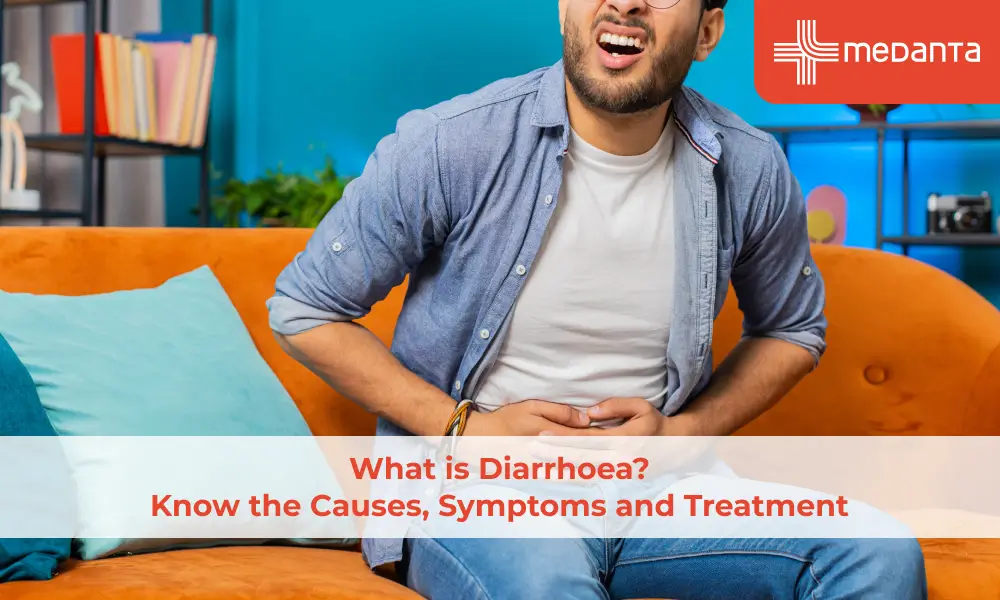What is Diarrhoea? Know the Causes, Symptoms and Treatment

TABLE OF CONTENTS
Most of us have experienced diarrhoea at some point every year. Usually, diarrhoea does not last long and goes away in a few days. However, if it persists longer, then it warrants your attention.
When you have diarrhoea, it is common to also feel the sense of urgency to rush to the toilet multiple times a day. You may also feel like vomiting in some cases, feel bloated or have stomach cramping.
Can diarrhoea be dangerous?
Diarrhoea is usually mild, but based on the causes and the severity, it can have dangerous complications, especially in children who suffer from losing a large part of their body fluid fast. The most significant dangers from diarrhoea all stem from the loss of water and electrolytes in your stool. Electrolytes help to keep the water in your body. When you lose them, your body not only loses the water it loses then but also can not keep more water that you try to take in, unless you correct the electrolytes. This dehydration causes dangerous complications such as:
Dehydration - Loss of a dangerous amount of water from your body affecting all functions
Electrolyte imbalances - Electrolytes help regulate various aspects of your body including digestion, waste disposal and even the action of muscles, nerves and the heart. Diarrhoea causes loss of Sodium, Potassium and Magnesium.
Kidney failure - This is caused when the kidney does not receive enough fluid/blood to filter.
Organ damage - Damage and shutdown of various organs from lack of blood supply or other factors, from dehydration
What are the types of Diarrhoea?
Acute diarrhoea - This is the most common type, does not usually need treatment and goes away in a few days.
Persistent diarrhoea - Diarrhoea that persists for two to four weeks
Chronic diarrhoea - Diarrhoea that tends to recur with time and lasts more than 4 weeks
What causes diarrhoea?
Diarrhoea can be caused by any factor that upsets the normal way your digestion and absorption work. If you retain more electrolytes in your digestive system or unabsorbed sugars, your stools will retain more water. Such changes can be caused by many factors like:
Viral infection
Bacterial infection
Parasitic infection
A side effect of medications like antibiotics
Lactose intolerance, Fructose intolerance
Artificial sweeteners
Surgery
Other digestive disorders like IBS, Crohn’s disease, celiac disease, ulcerative colitis, small intestinal bacterial growth or microscopic colitis
What are the symptoms of diarrhoea? When should I visit a doctor?
Loose or watery stools
Stomach pain & cramping
Bloated feeling
Feeling of vomiting
Vomiting
High body temperature
Blood in stool
Mucus in stool
Urgent need to empty
More frequent emptying
Weight loss
If you are an adult, diarrhoea is less problematic than it is for a child. However, you should visit a doctor if:
Diarrhoea continues for over 2 days and is not getting better
Signs of dehydration
Severe pain in the stomach or rectum
Blood in stools or black-coloured stools
Temperature above 39 °C or 102°F
In children, especially younger children with lower body weight (and so, less fluid overall), the effect of diarrhoea can be drastic very quickly. So, more attention should be given to warning signs. Visit your doctor if:
Diarrhoea does not improve in 24 hrs
The child is dehydrated
The child is refusing to eat or drink for a sustained period
The child has a high fever
The child has bloody or black coloured stools
What are the signs of dehydration?
In adults, the common symptoms are:
An excess feeling of thirst
Dry skin and/or mouth
Very less urine or no urine being passed
Weakness and dizziness
Dark urine colour
In infants and children, who can not speak to you, the following help to identify dehydration:
No passing of urine in a diaper or otherwise for 3 or more hours
Dryness in mouth and tongue
High fever
Lack of tears while crying
Sunken stomach, eyes or cheeks
Drowsiness or irritability
How is diarrhoea treated?
If your diarrhoea is serious, your doctor will recommend multiple tests that may include stool sample tests, urine tests or blood tests. If the situation looks serious, endoscopic examinations may be done. Your doctor is the best guide to help you with the right course of treatment, depending on the age and causes. One or more of the following methods may be recommended:
Antibiotics - to treat infections
Probiotics - to help good bacteria grow
Fluid & Electrolyte replacement - treatments like intravenous fluids or ORS solutions to help you recover your hydration, nutrition, and electrolyte statuses
Adjusting medications or diet
Treating underlying conditions
How to manage diarrhoea at home?
If the person with diarrhoea is a child, then attention must be given to any signs of dehydration and a doctor consulted as early as signs show. It is also important to note that certain over-the-counter medicines for adults may not work well in children and in fact, could be harmful. It is important to keep the child hydrated with breast milk, formula food or electrolyte drinks based on his/her age.
Some useful methods include:
Water & Electrolytes - Salted sweet lime juice, Electral or OTC rehydration mixtures, and water obtained while cooking rice with salt are all good options
Diet - adding more white rice, potatoes, noodles, bananas, fish etc to your diet may help in making stools more solid
Over-the-counter probiotics may help in developing better resistance to future infections
If you are experiencing diarrhoea after consuming an antibiotic or other medication, always check with your doctor before discontinuing the medicine mid-dose.






